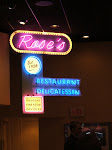This is something of an indication of the "radical" nature (for its time) of the process which lead to the creation of the U.S. Constitution. Akihil Reed Amar notes - in his masterful work America's Constitution - that some states, when voting for ratification convention delegates, did away with one of the most common restrictions on voting:
"For instance, New York temporarily set aside its usual property qualifications and, for the time its history, invited all free adult males to vote." - pg. 7
My first question is, does this mean that free blacks were voting? Well, as I sift through my mind I do seem to recall reading that some states in the early republic did allow for such. I can't recall a specific citation however.
Anyway, the notion of the radical nature of this development should be tempered with the knowledge that traditional notions regarding the role of the gentry, etc. remained alive and well into the 19th century. In other words, many people continued to think that the role of the citizen was at best to speak on officially designated days (e.g., election day) or through official channels, and to do so respectfully, while the role of their betters was to paternalistically fulfill these desires if they were appropriate and otherwise regulate society for its own good. One can see some of the clash between the gentry worldview and a worldview based on more "popular" notions in William Alan Taylor's Cooper's Town.
24 February 2007
23 February 2007
On Fearing Death
These are Lucretius' thoughts on dispelling religious belief (which is - according to Lucretius - chiefly caused by the fear of of what follows death):
This terror, then, this darkness of the mind,
Not sunrise with its flaring spokes of light,
Nor glittering arrows of morning can disperse,
But only Nature's aspect and her law,
Which, teaching us, hath this exordium:
Nothing from nothing ever yet was born.
-- Lucretius, Of The Nature Of Things (trans. William Ellery Leonard)
In other words, since no soul exists we need not worry about what we will encounter after death; we will encounter nothing because we will no longer exist.
This terror, then, this darkness of the mind,
Not sunrise with its flaring spokes of light,
Nor glittering arrows of morning can disperse,
But only Nature's aspect and her law,
Which, teaching us, hath this exordium:
Nothing from nothing ever yet was born.
-- Lucretius, Of The Nature Of Things (trans. William Ellery Leonard)
In other words, since no soul exists we need not worry about what we will encounter after death; we will encounter nothing because we will no longer exist.
22 February 2007
Care Of The Gods
Your fathers' guilt you still must pay,
Till, Roman, you restore each shrine,
Each temple, mouldering in decay,
And smoke-grimed statue, scarce divine.
Revering Heaven, you rule below;
Be that your base, your coping still;
'Tis Heaven neglected bids o'erflow
The measure of Italian ill.
-- Horace, Odes, Book III
Till, Roman, you restore each shrine,
Each temple, mouldering in decay,
And smoke-grimed statue, scarce divine.
Revering Heaven, you rule below;
Be that your base, your coping still;
'Tis Heaven neglected bids o'erflow
The measure of Italian ill.
-- Horace, Odes, Book III
Spinoza
Click here to watch a lecture by Prof. Nadler on Spinoza. Though I know something of Spinoza I know little about how he is viewed in the Jewish community, and this video provides some insight into the latter. I have to admit that the more I know about Jewish intellectual life the more fascinating I find it. I hope that doesn't sound too patronizing.
21 February 2007
End Times & The Bush Administration
I think that there is some concern that some elements of the "End Times", movement (?), have a lot of influence in the Bush administration's foreign policy. Ira Chernus has some thoughts on this subject here.
Sam Harris and Reza Aslan Debate
I do think that Sam Harris is right in arguing that moderate religious believers often provide cover for their less moderate co-adherants.
Addendum: I just realized that I forgot to provide a link to the debate. Many apologies.
Addendum: I just realized that I forgot to provide a link to the debate. Many apologies.
Subscribe to:
Comments (Atom)

